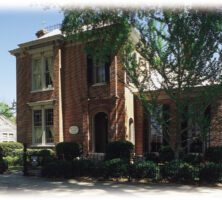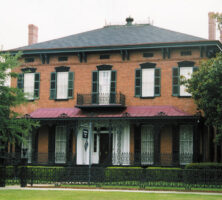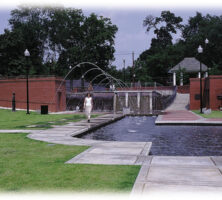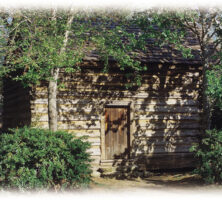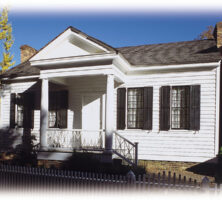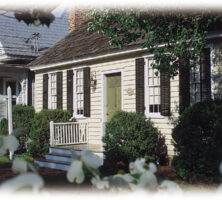Founded in June 1966, the Historic Columbus Foundation (HCF) is a nonprofit, tax-exempt organization. Its mission is to promote historic preservation, heritage education, and heritage tourism in Columbus, the seat of Muscogee County. HCF has an active board of directors and an advisory board of trustees, a growing membership of more than 1,500, and a full-time professional staff. It is an advocate for preservation through representation on numerous boards, such as the city’s Uptown Facade Board; Historic Chattahoochee Commission; Uptown Columbus, Incorporated; Board of Historic and Architectural Review; Gertrude “
In 1969, just three years after its founding, HCF played a major role in establishing the Columbus Historic District. In 1988 Heritage Corner was established as a tourist site of five structures owned by the foundation: a log cabin, circa 1800; the Walker-Peters-Langdon House, circa 1828; the Pemberton House, circa 1840; the Woodruff Farm House, circa 1840; and 700 Broadway, circa 1870.

Courtesy of Historic Columbus Foundation
With HCF support, a locally designated historic district, High Uptown, was established. In 2001 six new historic districts (Dinglewood, Wynn’s Hill–Overlook, Peacock Woods–Dimon Circle, Hillcrest–Wildwood Circle, Wynnton Village, and Liberty Heritage) were given local designation by the city council; for all six HCF was a strong partner and advocate. The Rankin House, in High Uptown, has been restored as an 1850-70 historic house museum and houses the foundation’s offices and research rooms.
HCF assisted with the establishment of the Chattahoochee Promenade, an outdoor history museum. The Seventh Street Project, a neighborhood revitalization effort, has been a public/private partnership through which HCF has saved and moved six endangered structures. This project continues with the purchase by HCF of numerous homes in the area for restoration and resale. Five endangered National Register properties were saved with Historic Columbus advocacy efforts in the Second Avenue Revitalization Project.

Courtesy of Historic Columbus Foundation
Threatened properties throughout Columbus are purchased for stabilization, resale, or restoration through HCF’s revolving/redevelopment fund. Since 1966 HCF has revolved more than seventy structures and properties through this fund. Interest-free facade loans are made available for home improvement in Columbus’s ten historic districts.
HCF was a partner in building Heritage Park, a $2.5 million water-enhanced park, which re lates the industrial history of Columbus from 1850 to 1910. Hands-on-History Camps, field trips, and in-school programs are provided for all schools. HCF began Young Historian groups in two high schools. “Our Town” instructional materials are provided to public and private schools in Muscogee County. These heritage education materials include Images; Our Town: An Introduction to the History of Columbus, Georgia; Architectural Styles of Our Town, Columbus, Georgia, with videos and teachers’ guides; and a coloring book entitled A Historic Tour of Our Town, Columbus, Georgia.

Courtesy of Historic Columbus Foundation
HCF has sponsored a variety of activiti es, including Heritage Tours for visitors, schoolchildren, and local residents; the Heritage Ball; weekend and day trips to historic sites; educational programs and seminars that feature noted preservationists and historians; and social functions for the forty-and-under group known as the Young Preservationists. It also sponsors Columbus’s largest annual festival, Riverfest Weekend, which attracts thousands of people to the Chattahoochee riverfront each spring.

Courtesy of Historic Columbus Foundation
Operating and administrative expenses for the foundation are obtained from membership dues and donations. Annual fundraisers provide monies for community preservation projects. HCF was also a $1 million beneficiary of the Columbus Challenge Campaign of the Community Projects Foundation, Incorporated.








